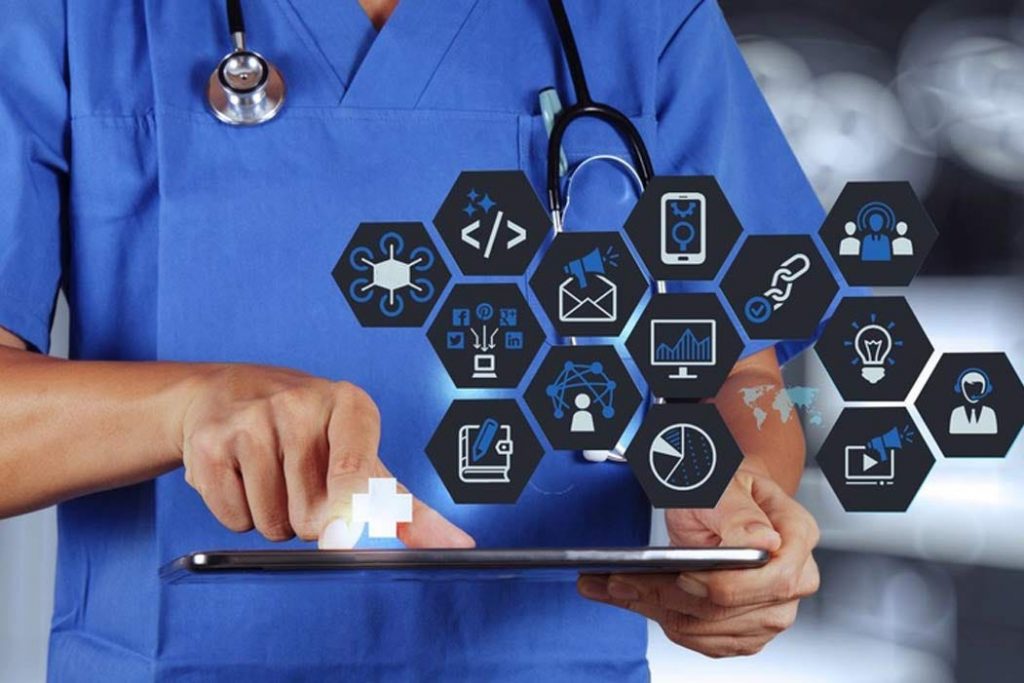
The adoption of Blockchain technology is undergoing a tremendous transition in the healthcare sector. However, Blockchain has the potential to transform healthcare by strengthening data security, enhancing interoperability, optimizing operations, and empowering patients.
Blockchain is a decentralized and secure digital ledger. For that, the article below will help in examining how Blockchain is advancing the healthcare sector in 2023 as well as the role that mobile app development firms and Healthcare App Development play in utilizing this technology.
Below Are Some Common Reasons How Blockchain Is Advancing The Healthcare Sector
Reason 1: Improved Data Security
Given that the healthcare sector deals with sensitive patient data, data security is a major problem. Healthcare data management and storage are now possible on a decentralized, unchangeable platform thanks to Blockchain technology.
Cryptographic Protection of Patient Information
However, patient data can be safely kept using cryptographic methods, protecting privacy and limiting unauthorized access.
Patient Control and Authorized Data Access
Moreover, patients have authority over their data via Blockchain, giving authorization to healthcare professionals and researchers as needed.
Secure Healthcare Mobile Applications Using Blockchain
Furthermore, Blockchain technology can be used by healthcare app development companies to create safe mobile applications that let users securely maintain and share their medical records.
Reason 2: Advances Interoperability
Interoperability Challenges in Healthcare Systems
Healthcare Organizations, including hospitals, clinics, laboratories, and pharmacies, frequently use disparate systems that are difficult to interact with one another, making interoperability a significant difficulty. Blockchain offers a transparent, standardized platform that encourages interoperability.
Secure Data Exchange Through Blockchain Technology
Blockchain makes it possible for healthcare providers to exchange data securely and easily thanks to smart contracts and consensus processes.
Role of Mobile App Development Companies in Blockchain Interoperability
However, building interoperable healthcare applications that use Blockchain technology to enable data sharing and communication across multiple actors in the healthcare ecosystem might be a crucial task for mobile app development companies.
Reason 3: Cost Savings and Streamlined Processes:
Automation of Administrative Healthcare Processes
Blockchain has the ability to make processes more efficient and make healthcare more affordable. However, smart contracts enable the automation of administrative processes including claims processing, billing, and supply chain management, obviating the need for middlemen and lowering administrative costs.
Reducing Fraud and Errors Through Blockchain Transparency
By offering a transparent and unchangeable audit record of transactions, Blockchain-based systems can also lower fraud and mistakes.
Blockchain-Powered Apps for Efficiency and Cost Reduction
However, Blockchain-powered applications can be created by mobile app development companies that will automate procedures, boost productivity, and save expenses for patients and healthcare providers.
Reason 4: Patient Empowerment
Greater Control Over Medical Data
Patients are empowered by Blockchain technology because it gives them more control over their medical data. However, patients can use Blockchain to securely access and control their medical records, share information with healthcare professionals, and even make money off of it through consent-based data sharing.
Increased Autonomy and Personalized Healthcare
Moreover, it changes in data ownership and control increases patient autonomy, makes research easier, and makes personalized healthcare possible.
Blockchain-Based Patient-Centric Mobile Applications
Furthermore, Blockchain technology can be used by healthcare app development companies to create mobile applications that give patients safe and convenient tools for managing their health information and taking part in their own care.
Reason 5: Obstacles and Prospects
Although Blockchain technology has a lot of potential for the healthcare sector, there are still several issues that need to be resolved. However, these include issues with rules and laws, data standardization, scalability, and compatibility with already installed systems.
Moreover, these obstacles can be solved, though, with continued research, stakeholder cooperation, and technological breakthroughs.
Reason 6: Clinical Trials Using Blockchain
Challenges in Traditional Clinical Trial Processes
Clinical trial technology is significantly advancing thanks to Blockchain technology. However, clinical trials are essential to the creation of new medications and therapies, but they are frequently hampered by problems with patient recruitment, data quality, and transparency.
Secure and Transparent Clinical Trial Data Management
By offering a safe and open platform for managing and verifying clinical trial data, Blockchain can help with these problems.
Data Integrity and Tamper-Proof Storage with Blockchain
Blockchain enables the secure storage and authorized access to clinical trial data, preserving its integrity and preventing tampering. Blockchain’s decentralized structure eliminates reliance on a single central authority, lowering the possibility of data manipulation.
Smart Contracts for Protocol Compliance
By automating and enforcing adherence to trial protocols, smart contracts may make sure that all parties involved follow the set rules and conditions.
Reason 7: Blockchain and Healthcare Supply Chain Management
Complexity of the Healthcare Supply Chain
Blockchain technology is transforming healthcare supply chain management in addition to its effects on clinical trials and data security. However, the healthcare supply chain is complex and involves many parties, such as producers, distributors, drugstores, and healthcare professionals.
Importance of Integrity and Authenticity in Healthcare Supplies
For patient safety, it is essential to guarantee the integrity and authenticity of pharmaceutical items, medical equipment, and supplies.
Tracking and Tracing with Blockchain Technology
The decentralized and transparent platform offered by Blockchain makes it possible to track and trace the flow of commodities across the supply chain. The Blockchain enables the creation of an immutable audit trail by recording every transaction and movement of a product.
Preventing Counterfeit Drugs and Ensuring Compliance
However, it reduces the risk of counterfeit medications and ensures regulatory compliance by allowing stakeholders to confirm the product’s origin, legitimacy, and quality.
Reason 8: Telemedicine and Blockchain
Growth of Telemedicine Through Technology
The practice of delivering medical care remotely via technology, or telemedicine, has grown significantly in popularity in recent years. By solving important issues like data security, privacy, and interoperability, the emergence of Blockchain technology has the potential to substantially improve telemedicine.
Secure and Private Telemedicine Data Management
Blockchain encrypts and stores patient data in a decentralized manner, ensuring the security and privacy of telemedicine interactions. It enables patients to securely communicate with medical staff while maintaining privacy and limiting unauthorized access.
Smart Contracts for Consent and Authorized Access
Smart contracts can be used to automate the consent process and make sure that only authorized parties have access to data.
Reason 9: Blockchain and Medical Research
Blockchain’s Role in Transforming Medical Research
By solving important issues like data integrity, cooperation, and participation incentives, Blockchain technology has the potential to transform medical research. Medical researchers can increase study integrity, open up new data exchange opportunities, and speed up the research process by utilizing Blockchain.
Data Integrity and Traceability in Medical Research
The capacity of Blockchain to maintain data integrity and traceability is one of the technology’s main benefits in medical research. However, research data stored on the Blockchain becomes visible and unchangeable, lowering the possibility of data fraud or manipulation.
Enhancing Reliability and Credibility of Research Findings
The reliability of scientific information is increased as a result, increasing the credibility and repeatability of study findings.
Future of Blockchain Technology in Healthcare
Blockchain technology in healthcare has a bright future. Moreover, we may anticipate widespread industry use as the technology develops.
Role of App Development Companies in Blockchain Adoption
However, healthcare app development and mobile app development firms will keep playing a crucial role in utilizing Blockchain’s potential to offer cutting-edge solutions that enhance data security, improve patient outcomes, and boost operational effectiveness.
Conclusion
By strengthening data security, enhancing interoperability, optimizing operations, and empowering patients, Blockchain technology is revolutionizing the healthcare sector in 2023.
In order to create safe, interoperable, and user-friendly applications that meet the difficulties facing the sector, Mobile App Development Company plays a critical role in harnessing Blockchain.
Blockchain technology has enormous potential to revolutionize healthcare as it develops, providing individualized care, cutting costs, and boosting collaboration throughout the healthcare ecosystem.









